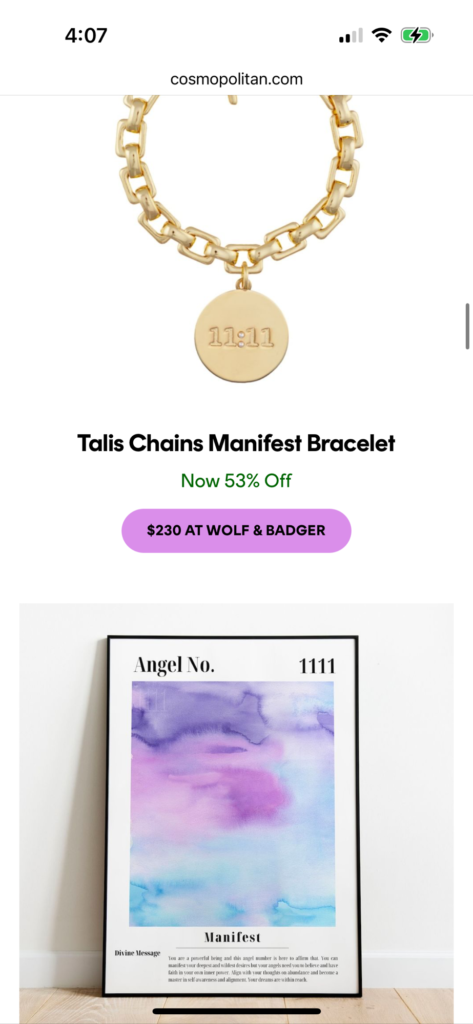I like a little “woo” in my life. Anytime I hit a particularly interesting number in my daily writing I tend to do a bit of collective consciousness spelunking across the shared spaces of the internet.
Unsurprisingly, 1111 sparks quite a bit of interest across pop culture numerology depictions. The first search results were women’s interest magazines.
Women’s Health with the uplifting new beginnings represented by 1 before associating 11 as a doubling of 1’s energy as a “master number” with spiritual insight, enlightenment, and intuitive understanding.” Sure, I want an intuitive understanding of my life’s new beginnings. Good job magazine editors. Groundbreaking.
Cosmopolitan, that sexy staple of American feminine mysteries, went a bit further and called 1111 an Angel Number and curated an ecommerce shop of 1111 products including oud manifestations candles, bracelets and Etsy prints.

Because what good is hidden knowledge of divine intentions without an affiliate marketing link program with it? I’d love to know if search engine optimization on numerology combined with attractively curated e-commerce affiliate content hits the Cosmopolitan P&L in any meaningful way.
Crunchier new age websites were equally amusing. MindBodyGreen kept at the message of intuition and messages from your divine power. Synchronicity showed up on every internet tidbit from Wikipedia to good old WikiHow.
Glamor Magazine at least gently reminded readers that apophenia is an error of perception. Who knew Condé Nast was the publishing house for skeptics? Perhaps they need to be a trusted brand or nail salons won’t subscribe in bulk across the nation to their magazines.
But if you really want lean into your pattern recognition and the subtle schizophrenia of Internet apophenia, my original source Women’s Health helpfully leans into “service journalism” by sharing that Kabbalists 1111 is a sign from God or divinity itself.
This is because the ancient Hebrew name for God, Yahweh or YHWH, when written resembles four ones.
Women’s Health Numerologist’s Interpret 1111
I will caution readers that I don’t know if any of this is true. Obviously my goofy posting shouldn’t be seen as having the same rigor as a LessWrong epistemic status post. While I like a post-rationalist, I don’t know if any of the consumer friendly versions of ancient wisdom is true. I wouldn’t be taking my reading of the Talmud from magazines typically dedicated to recipes and workouts myself.
Women browsing random bits of pattern recognition at the grocery store or on their phone really is the stuff of fluff and the stuff of fear. Who knows what bits of knowledge might lead us astray.
Best case scenario you end up with a nice Oud candle that helped keep Cosmopolitan quiz writers paid. Worst case scenario, you might summon a malevolent algorithmic rabbit hole determined to fill your feeds with angels and demons.

